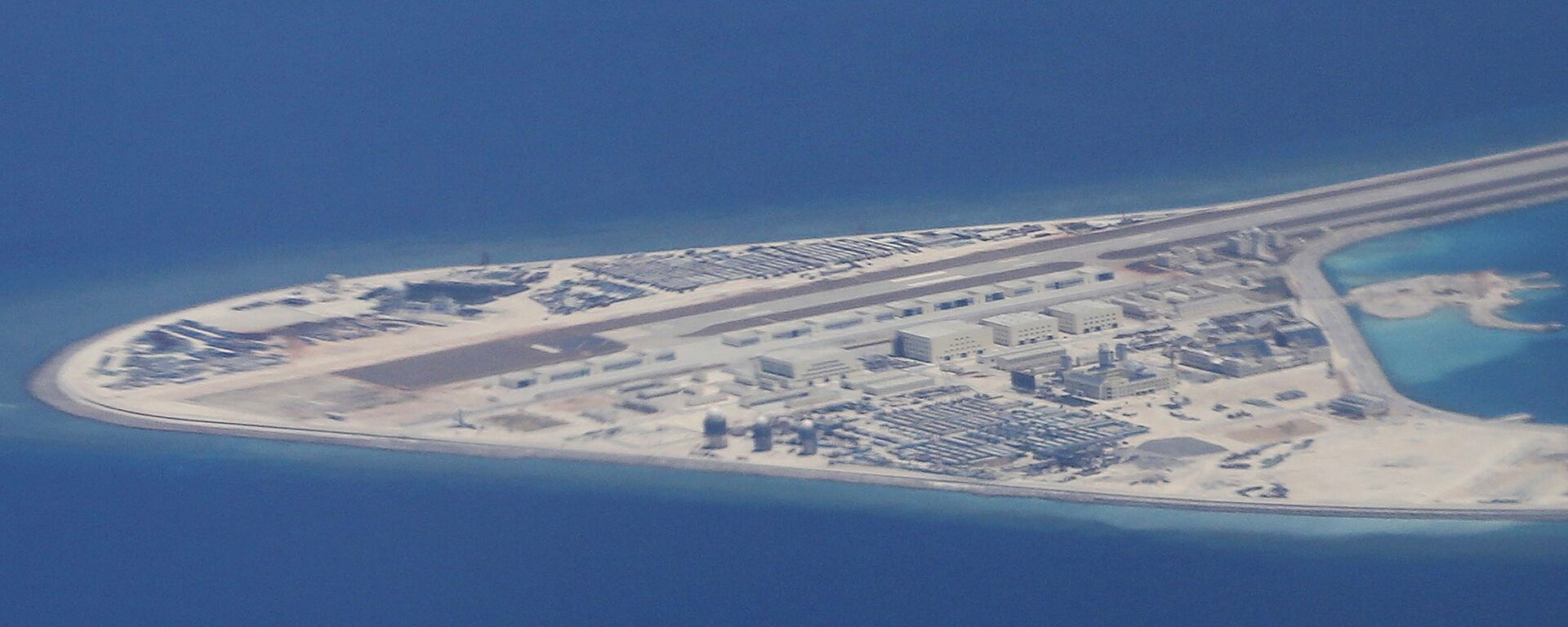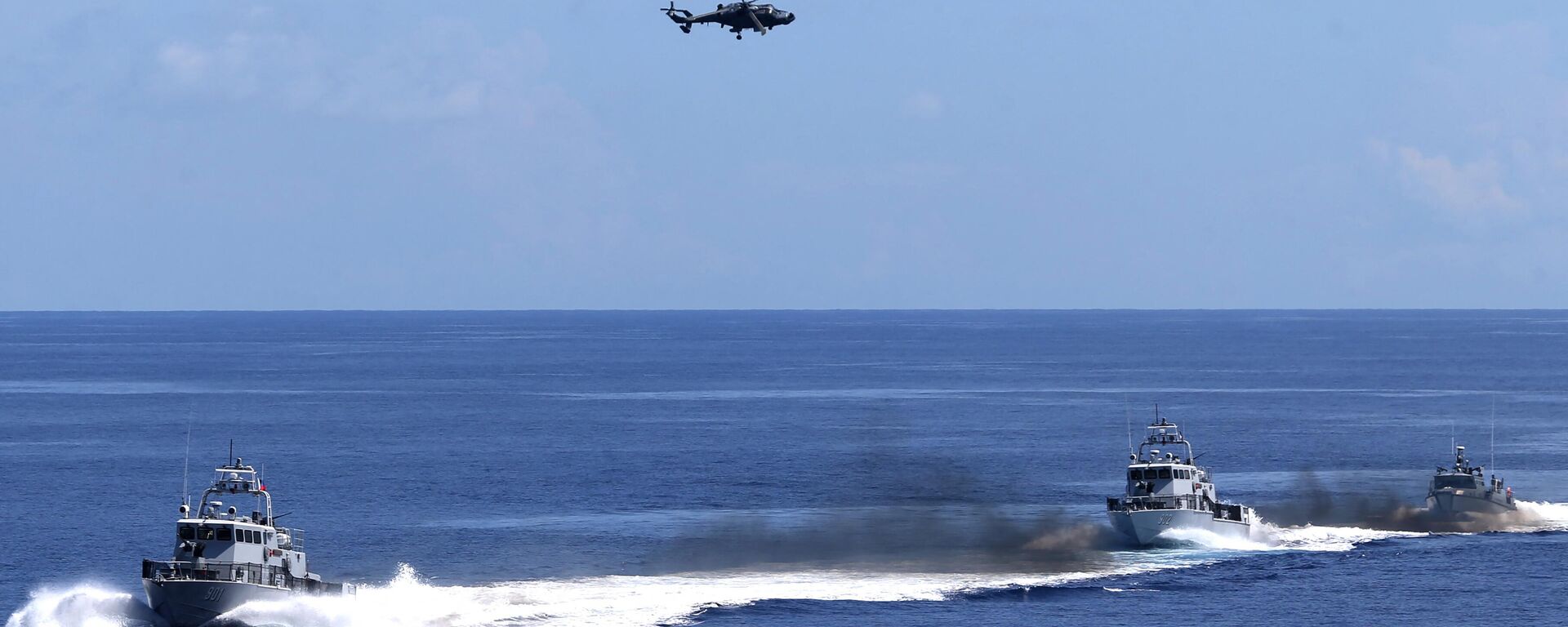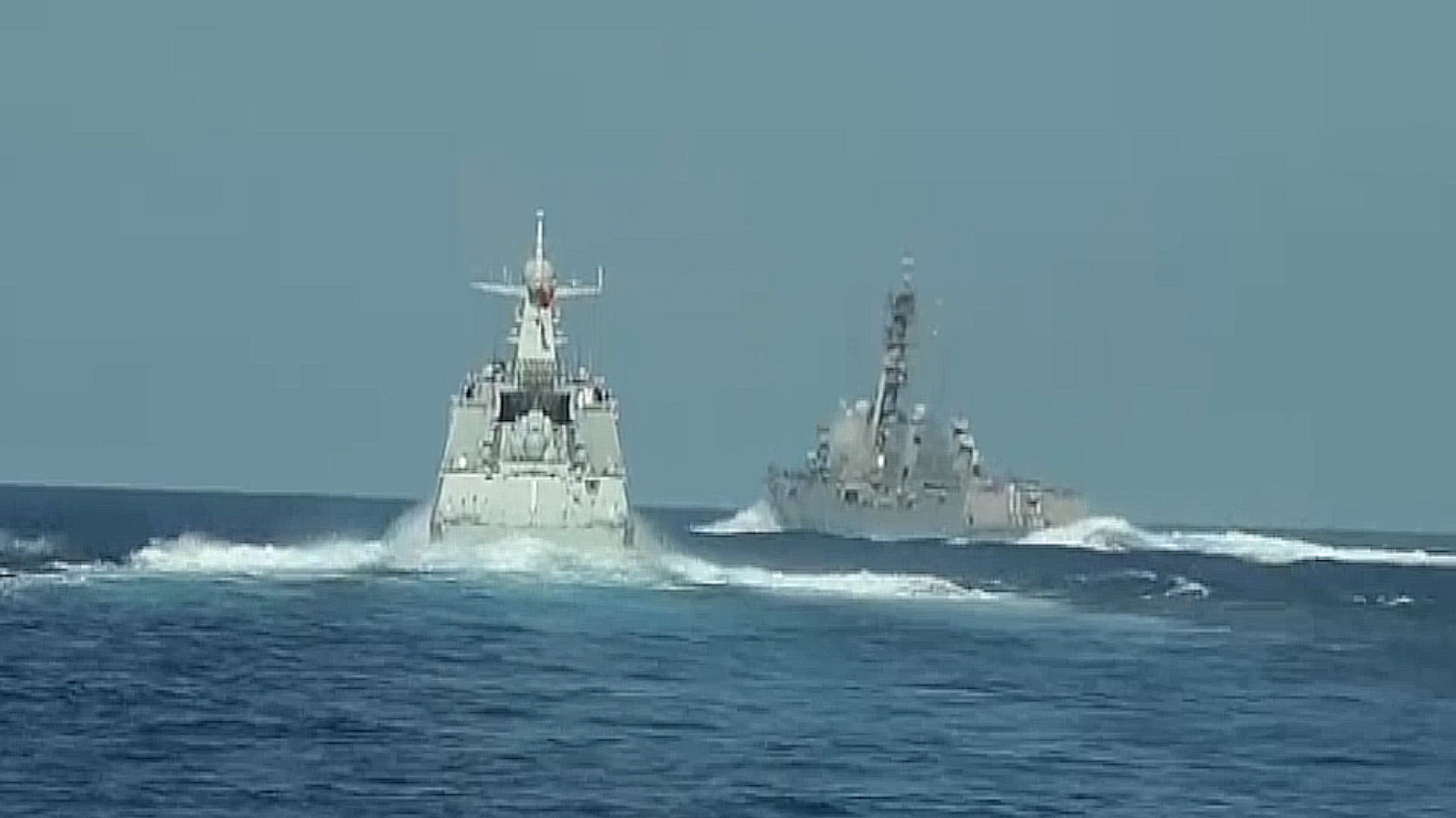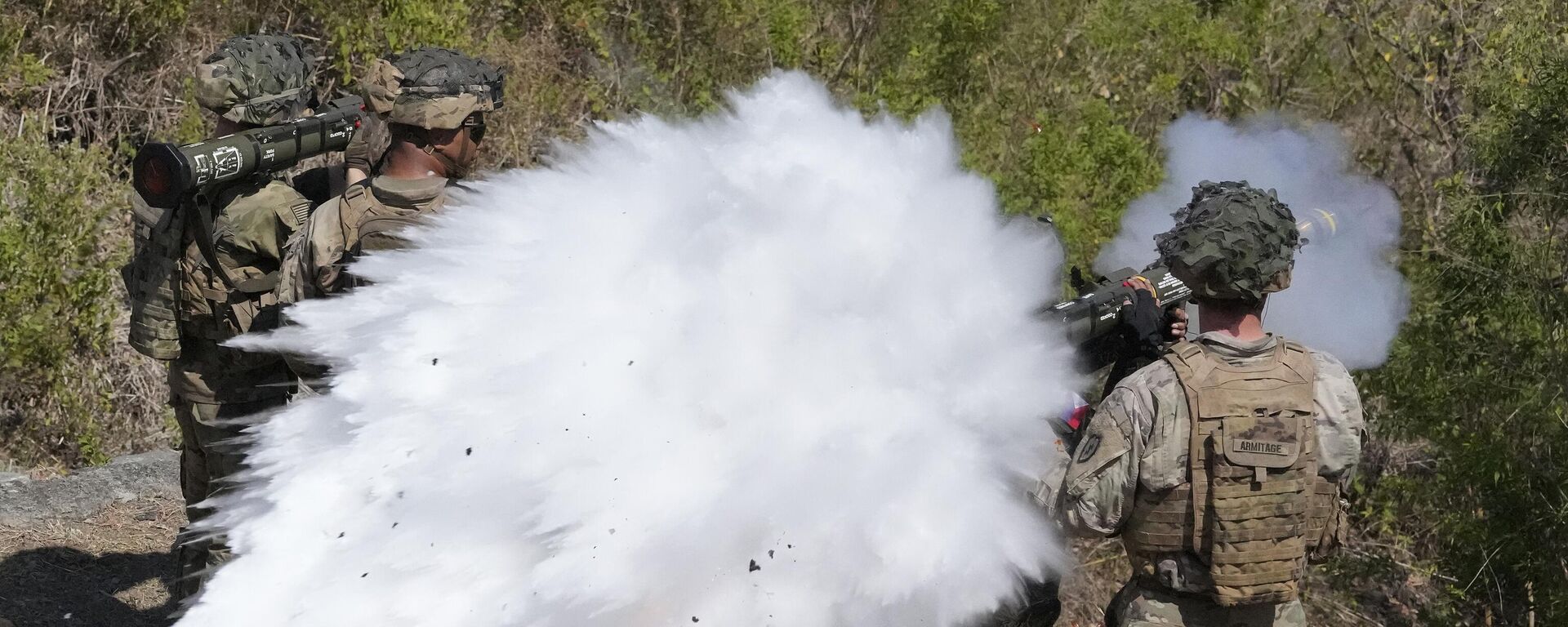https://sputnikglobe.com/20231228/dc-think-tank-growing-philippine-china-row-is-byproduct-of-us-presence-in-asia-pacific-1115855875.html
DC Think Tank: Growing Philippine-China Row is Byproduct of US Presence in Asia-Pacific
DC Think Tank: Growing Philippine-China Row is Byproduct of US Presence in Asia-Pacific
Sputnik International
The Beijing-Manila tensions are fanned by Washington's assertive actions in the South China Sea and may potentially lead to a regional conflict, the Quincy Institute for Responsible Statecraft warned on December 28.
2023-12-28T15:16+0000
2023-12-28T15:16+0000
2023-12-28T15:16+0000
south china sea
world
china
philippines
asia-pacific region
pivot to asia
us
us military bases
maritime dispute
https://cdn1.img.sputnikglobe.com/img/07e7/0a/1a/1114510914_22:0:1800:1000_1920x0_80_0_0_4c1204b74854068dde0f04b101cbf038.png
Sino-Filipino tensions over the South China Sea have grown, with Beijing warning the Philippines against "causing trouble and chaos".China’s Foreign Minister Wang Yi urged Manila to act with "caution", stressing that the nations' relations "are at a crossroads" on December 20. The remarks came in response to a series of encounters in the South China Sea, including a collision of a Philippine boat and a Chinese Coast Guard ship near the hotly contested Spratly Islands earlier this month.The Philippines claimed that, "China Coast Guard and Chinese Maritime Militia vessels harassed, blocked and executed dangerous maneuvers on Philippine civilian supply vessels". Beijing shredded the allegations, accusing the Philippine vessel of "disregarding multiple stern warnings" and "deliberately colliding" with the Chinese ship.On December 25, the People's Daily, a Chinese state-run newspaper, blamed the US for the escalation of tensions, arguing that "The Philippines relies on the support of external forces, ignores China’s goodwill and restraint, and repeatedly provokes China’s principles and bottom line."The Quincy Institute for Responsible Statecraft - a Washington-based think tank - believes that China's stance has certain merit.The unfolding row between China and the Philippines is far from the only theater in Beijing's ongoing maritime disputes. However, it has escalated to a greater degree than many of the others, the report said, citing Sarang Shidore, director of the Global South Program at QI. As per Shidore, Manila's assertive response to China's tactics in the South China Sea, which is almost entirely claimed by Beijing, is "partly as a byproduct of American presence in the region."Indeed, the US has enhanced military cooperation with Manila after Filipino President Ferdinand Marcos took the reins of the government. Under Marcos, Manila's relations with Beijing have become strained, whereas under his predecessor Rodrigo Duterte, most Philippine-Chinese disputes were routinely solved. Marcos is also known for his pro-Western stance and announced at the beginning of 2023 that his government was considering a tripartite security pact with the US and Japan.In February, the Marcos administration granted the US military access to four additional Philippine military bases in addition to the five existing sites under the US-Philippine 2014 Enhanced Defense Cooperation Agreement.In August, reports emerged saying that the US military was in talks to develop a port in the Filipino northwestern Batanes islands which could give Washington some control over the Bashi Channel – a part of the Luzon Strait between the East China Sea and the South China Sea. The channel is considered to be a choke point for Chinese vessels moving between the Western Pacific and the South China Sea. Per Goldstein, the Luzon Strait has become an "increasingly important" part of the US preparations for a "Taiwan contingency" amid growing tensions between Beijing and Washington over the island. "The US has been trying to put in place the groundwork to prepare for a day when they have to surge forces in a major way into Luzon," the US scholar said.The DC-based think tank noted that Beijing sees Washington's grand design and continues to warn Manila about the potentially disastrous consequences of the US-Filipino cooperation on the Taiwan scenario.Per the think tank, the US should not encourage Manila to engage in a direct conflict with China not only because it is likely to end very badly for the Philippines, but is fraught with a risk for the US to be dragged into the conflict. The 1951 US-Philippines Mutual Defense Treaty requires both nations to support each other if another party attacks them.Even though the current Sino-Filipino dispute has not yet translated into a serious crisis, it has become "an increasingly dangerous proxy and potential flashpoint" for the simmering US-China tensions, the think tank's report concluded.
https://sputnikglobe.com/20231225/beijing-castigates-philippines-extremely-dangerous-south-china-sea-incursions-1115803977.html
https://sputnikglobe.com/20231125/australia-and-philippines-launch-joint-naval-patrols-in-south-china-sea-1115203497.html
https://sputnikglobe.com/20230908/why-australia-philippines-deal-is-part-of-broader-us-effort-to-encircle-china-1113214053.html
https://sputnikglobe.com/20230501/new-us-bases-in-philippines-may-set-asia-pacific-on-fire-1109989761.html
china
Sputnik International
feedback@sputniknews.com
+74956456601
MIA „Rossiya Segodnya“
2023
News
en_EN
Sputnik International
feedback@sputniknews.com
+74956456601
MIA „Rossiya Segodnya“
Sputnik International
feedback@sputniknews.com
+74956456601
MIA „Rossiya Segodnya“
us' pivot to asia, us presence in asia pacific, biden's indo-pacific strategy, the philippines, the philippines-china maritime dispute in south china sea, us-philippines military pact, potential regional conflict in asia pacific, us conflict with china over taiwan
us' pivot to asia, us presence in asia pacific, biden's indo-pacific strategy, the philippines, the philippines-china maritime dispute in south china sea, us-philippines military pact, potential regional conflict in asia pacific, us conflict with china over taiwan
DC Think Tank: Growing Philippine-China Row is Byproduct of US Presence in Asia-Pacific
The Beijing-Manila tensions are fanned by Washington's assertive actions in the South China Sea and may potentially lead to a regional conflict, the Quincy Institute for Responsible Statecraft warned on December 28.
Sino-Filipino tensions over the South China Sea have grown, with Beijing warning the Philippines against "causing trouble and chaos".
China’s Foreign Minister Wang Yi urged Manila to act with "caution", stressing that the nations' relations "are at a crossroads" on December 20. The remarks came in response to a series of encounters in the South China Sea, including a collision of a Philippine boat and a Chinese Coast Guard ship near the hotly contested Spratly Islands earlier this month.
The Philippines claimed that, "China Coast Guard and Chinese Maritime Militia vessels harassed, blocked and executed dangerous maneuvers on Philippine civilian supply vessels". Beijing shredded the allegations, accusing the Philippine vessel of "disregarding multiple stern warnings" and "deliberately colliding" with the Chinese ship.
On December 25, the People's Daily, a Chinese state-run newspaper, blamed the US for the escalation of tensions, arguing that "The Philippines relies on the support of external forces, ignores China’s goodwill and restraint, and repeatedly provokes China’s principles and bottom line."

25 December 2023, 18:09 GMT
The Quincy Institute for Responsible Statecraft - a Washington-based think tank - believes that China's stance has certain merit.
The unfolding row between China and the Philippines is far from the only theater in Beijing's ongoing maritime disputes. However, it has escalated to a greater degree than many of the others, the report said, citing Sarang Shidore, director of the Global South Program at QI. As per Shidore, Manila's assertive response to China's tactics in the South China Sea, which is almost entirely claimed by Beijing, is "partly as a byproduct of American presence in the region."
"I think US involvement is a big reason – the fact that the US is present in the theater, and there is an alliance commitment, makes the situation not just a China-Philippines issue but a China-US issue, and that’s when everything changes from the Chinese perspective," the scholar said. "The Chinese, I think, are more concerned about the US at this point than the Philippines."

25 November 2023, 13:19 GMT
Indeed, the US has enhanced military cooperation with Manila after Filipino President Ferdinand Marcos took the reins of the government. Under Marcos, Manila's relations with Beijing have become strained, whereas under his predecessor Rodrigo Duterte, most Philippine-Chinese disputes were routinely solved.
Marcos is also known for his pro-Western stance and announced at the beginning of 2023 that his government was considering a tripartite security pact with the US and Japan.
In February, the Marcos administration granted the US military access to
four additional Philippine military bases in addition to the five existing sites under the US-Philippine 2014 Enhanced Defense Cooperation Agreement.

8 September 2023, 18:39 GMT
In August, reports emerged saying that the US military was in talks to develop a port in the Filipino northwestern Batanes islands which could give Washington some control over the Bashi Channel – a part of the Luzon Strait between the East China Sea and the South China Sea. The channel is considered to be a choke point for Chinese vessels moving between the Western Pacific and the South China Sea.
"They [the Chinese] perceive that the stakes for them are very high. I believe all this tension with the Philippines is an outgrowth of Taiwan tension," Lyle Goldstein, director of Asia Engagement at Defense Priorities told the DC-based think tank.
Per Goldstein, the Luzon Strait has become an "increasingly important" part of the US preparations for a "Taiwan contingency" amid growing tensions between Beijing and Washington over the island. "The US has been trying to put in place the groundwork to prepare for a day when they have to surge forces in a major way into Luzon," the US scholar said.
The DC-based think tank noted that Beijing sees Washington's grand design and
continues to warn Manila about the potentially disastrous consequences of the US-Filipino cooperation on the Taiwan scenario.
Per the think tank, the US should not encourage Manila to engage in a direct conflict with China not only because it is likely to end very badly for the Philippines, but is fraught with a risk for the US to be dragged into the conflict. The 1951 US-Philippines Mutual Defense Treaty requires both nations to support each other if another party attacks them.
"My view is that we should not even consider going to war over rocks and reefs or different interpretations of the law of the sea. That would be extremely foolish and reckless, and it would be very hard to explain to American taxpayers," Goldstein warned.
Even though the current Sino-Filipino dispute has not yet translated into a serious crisis, it has become "an increasingly dangerous proxy and potential flashpoint" for the simmering US-China tensions, the think tank's report concluded.






